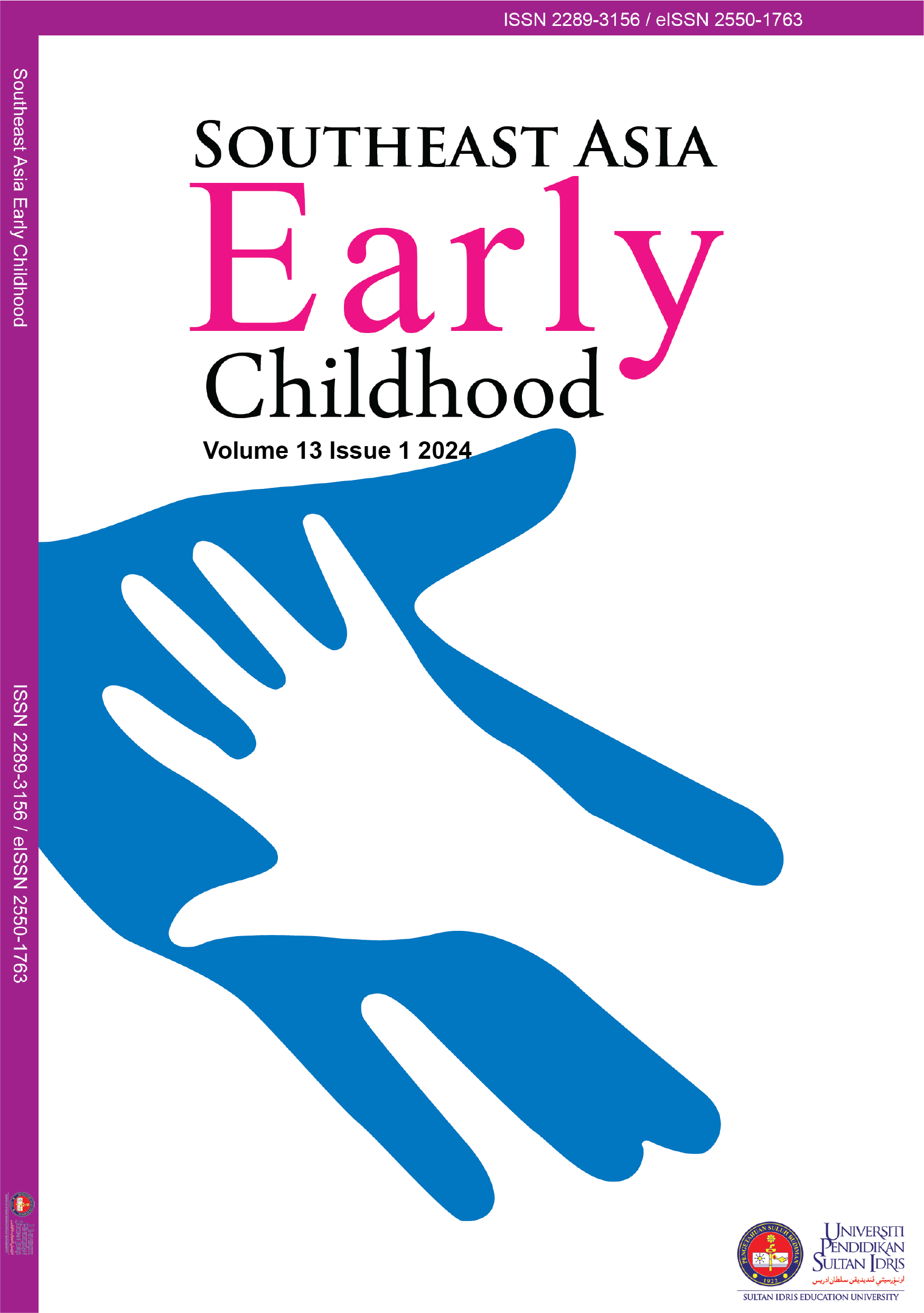Unlocking Voices: A Multifaceted Approach in Assessing and Managing a Preschooler with Selective Mutism
DOI:
https://doi.org/10.37134/saecj.vol13.1.6.2024Keywords:
preschoolers, selective mutism, exposure therapy, case studyAbstract
This case study aims to report on the psychological assessment and intervention for a 4-year-old preschooler with selective mutism. A comprehensive assessment that involves parents and teacher interview, classroom observation, Seguin Form Board Test (SFBT), Vineland Adaptive Behaviour Scales Third Edition (Vineland-3), Behaviour Assessment System for Children, Third Edition (BASC-3), Childhood Autism Rating Scale, Second Edition Standard Version Rating Booklet (CARS 2-ST), and School Speech Questionnaire were conducted. The psychological assessment revealed that the child fulfils the criteria for selective mutism. Play-based intervention sessions were then conducted, which involved gradual exposure to the child’s teacher and peers and facilitation of verbalization related to child’s interests and classroom routines. The child demonstrated improvement in her frequency of verbalizing in the classroom following the intervention, as supported by the improved score in the School Speech Questionnaire (SSQ). This case study illustrates the advantages of a collaborative approach that engages parents, teachers, and peers in the management of selective mutism during early childhood.
Downloads
References
American Psychiatric Association (APA) (2022). Diagnostic and Statistical Manual of Mental Disorders, Fifth Edition, Text Revision (DSM-5-TR™). Arlington, VA: APA.
Bergman, R. L., Piacentini, J., & McCracken, J. T. (2002). Prevalence and description of selective mutism in a school-based sample. Journal of the American Academy of Child & Adolescent Psychiatry, 41(8), 938-946. https://doi.org/10.1097/00004583-200208000-00012
Furr, J. M., Sanchez, A. L., Hong, N., & Comer, J. S. (2020). Exposure therapy for childhood selective mutism: Principles, practices, and procedures. In Exposure therapy for children with anxiety and OCD (pp. 113-142). Academic Press. https://doi.org/10.1016/B978-0-12-815915-6.00006-8
Gilliam, J. E. (2014). Gilliam Autism Rating Scale-Third Edition (GARS-3). Pro-Ed.
Dogru, H., Ucuz, I., Uzun Cicek, A., & Comertoglu Arslan, S. (2023). Clinical characteristics according to sex and symptom severity in children with selective mutism: a four-center study. Nordic Journal of Psychiatry, 77(2), 158-164. https://doi.org/10.1080/08039488.2022.2146748
Kearney, C. A., & Rede, M. (2021). The heterogeneity of selective mutism: A primer for a more refined approach. Frontiers in Psychology, 12, 700-745. https://doi.org/10.3389/fpsyg.2021.700745
Kovac, L. M., & Furr, J. M. (2019). What teachers should know about selective mutism in early childhood. Early Childhood Education Journal, 47, 107-114. https://doi.org/10.1007/s10643-018-0905-y
Lee, S. H., Saw, J. A., & Ramlee, F. (2024). Role of Play-based Intervention in Managing Selective Mutism in a Young Child: A Case Study. Journal of Cognitive Sciences and Human Development, 10(1), 1-10. https://doi.org/10.33736/jcshd.6046.2024
Martino, E. M., & Lape, J. E. (2021). Occupational therapy in the preschool classroom-Promoting fine motor and visual motor skills for kindergarten readiness. Journal of Occupational Therapy, Schools, & Early Intervention, 14(2), 134-152. https://doi.org/10.1080/19411243.2020.1822261
Muris, P., Monait, N., Weijsters, L., & Ollendick, T. H. (2021). Symptoms of selective mutism in non-clinical 3-to 6-year-old children: relations with social anxiety, autistic features, and behavioural inhibition. Frontiers in Psychology, 12, 669907. https://doi.org/10.3389/fpsyg.2021.669907
Muris, P., & Ollendick, T. H. (2021). Current challenges in the diagnosis and management of selective mutism in children. Psychology Research and Behavior Management, 159-167. https://doi.org/10.2147/PRBM.S274538
Reynolds, C. R., & Kamphaus, R. W. (2015). Behavior Assessment System for Children, Third Edition (BASC-3). Pearson.
Rozenek, E. B., Orlof, W., Nowicka, Z. M., Wilczyńska, K., & Waszkiewicz, N. (2020). Selective mutism-an overview of the condition and etiology: is the absence of speech just the tip of the iceberg?. Psychiatria polska, 54(2), 333-349. https://doi.org/10.12740/PP/OnlineFirst/108503
Schopler, E., Van Bourgondien, M. E., Wellman, G. J., & Love, S. R. (2010). Childhood Autism Rating Scale, Second Edition (CARS 2-ST). Western Psychological Services.
Seguin, E. (1928). The Seguin Form Board Test. Barnes & Noble.
Sparrow, S. S., Cicchetti, D. V., & Balla, D. A. (2016). Vineland Adaptive Behavior Scales, Third Edition (Vineland-3). Pearson.
White, J., & Bond, C. (2022). The role that schools hold in supporting young people with selective mutism: a systematic literature review. Journal of Research in Special Educational Needs, 22(3), 232-242. https://doi.org/10.1111/1471-3802.12561
Zakszeski, B. N., & DuPaul, G. J. (2017). Reinforce, shape, expose, and fade: a review of treatments for selective mutism (2005–2015). School Mental Health, 9, 1-15. https://doi.org/10.1007/s12310-016-9198-8
Downloads
Published
Issue
Section
License
Copyright (c) 2024 Sook Huey Lee, Asma Perveen, Fatanah Ramlee

This work is licensed under a Creative Commons Attribution-NonCommercial-ShareAlike 4.0 International License.





